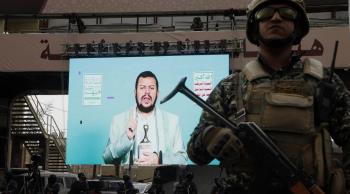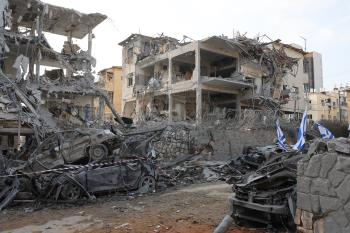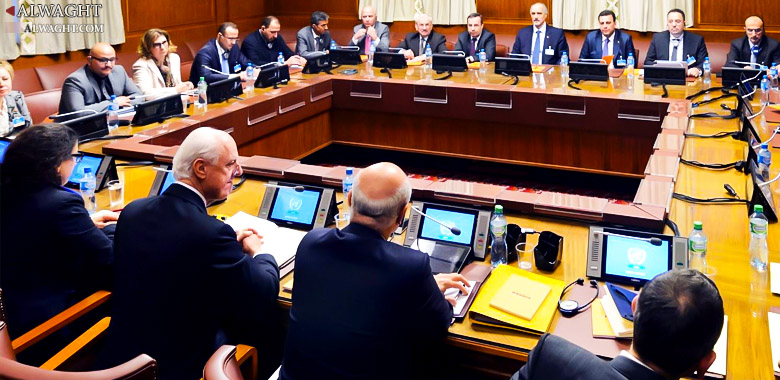Alwaght- The new round of Syrian peace talks would be, without doubt, of special significance for a couple of reasons. On the one hand they coincided with the country’s parliamentary elections and on the other hand the Syrian army in association with its allies are making the final preparations for a massive battle to take back the northern province of Aleppo from the terrorists. These two significant factors together could give the central Syrian government the upper hand.
The parliamentary election is actually the second official voting process across the country since the crisis begun in 2011. It included 3500 candidates competing for 250 Syrian parliamentary seats. Some Syrians call the election the “election of resistance”. The successful holding of the election has strengthened the legitimacy of the Syrian political system at home and internationally. It was, in fact, a factor thwarting the accusations of the opposition as well as foreign sides that Syrian government in Damascus was illegitimate. Preventing a political power vacuum, the successful parliamentary have been seen as much needed to lead the country out of current dangerous period.
On the other side, the peace negotiations are becoming extremely complicated as the fighting rages between the opposition and government forces around the strategic Aleppo city. Receiving support from the Russian jets, the Syrian government’s forces are launching their assault against both the rebel and terrorist forces.
Some suggest that the renewed round of clashes of both sides mostly in northern Aleppo could challenge the truce which was agreed upon one and a half months ago. The terrorist groups ISIS and al-Nusra Front were excluded from the deal to cease fire, however some say that the ceasefire could fail because many of opposition groups are engaged in fighting in the area. In fact, Aleppo stands as Syria’s key city because different sides of Syrian crisis are active in the city. Since Sunday some 210 fighters, including 94 from al-Nusra Front and 34 from ISIS, have been killed in the clashes. ISIS, a major terror group active in Syria, is now losing strength and is actually in the weakest status since 2014 because it has the smallest number of forces in almost two years.
But, meanwhile, two major points have hampered the peace talks of Syria. First, some international powers insist that the Syrian President Bashar al-Assad should stay in power even after a final deal is reached. They say that the political solutions and election would determine Assad’s place in future of Syria.
Second, so far, due to strains of foreign powers like Saudi Arabia and Turkey it has so far been unsuccessful to draw clear lines between the real opposition and the terrorist groups and actually the case remains in ambiguity.
Beside these two points it should be taken into account that despite the fact that the Syrian opposition forces have expressed readiness for direct negotiations, the UN envoy to the Syrian crisis Staffan de Mistura has said both sides presented no specific structures for face-to-face dialogue.
All in all, the first and major sticking point between the government’s representatives and the opposition delegation is the fate of President Assad in future Syria. While opposition groups insist that President Assad must step down, the representatives of the government and Assad’s allies reiterate that the Syrian president is a red line. Transitional government formation, change of the constitution and holding presidential elections are high on the agenda of the new round of peace talks, however, the opposition groups have asserted that the transitional process must be undertaken by a side which has full administrative powers. At the same time, Damascus said that it sought a new constitution and a national unity government which included the opposition groups.
Russia has also said that it was necessary for all of the negotiating sides to approve of amendment of the constitution as well as holding election. The opposition also recently said that it was ready to work with government under a transitional council in case President Assad agreed to leave the power. But the pro-Assad regional powers are still rejecting the Western efforts to set up a pre-planned future for the Syrian president.
On the other hand, it cannot be expected that the anti-Assad powers be passive. The Wall Street Journal in one of its articles on early March reported that the US government had a secret plan to back the terrorist groups battling the Syrian government. The same article also uncovered sending air defense systems to the terrorists by Turkey and Saudi Arabia. Also, some of the news agencies have reported that the terrorists of al-Nusra Front were equipped with new weapons and forces and sent to Syria through Turkey. According to the published reports at least 100 terrorist forces with 22 military vehicles on Sunday entered Handarat camp north of Syria. At the same time, 200 militants were deployed to Tel Hadyeh in Aleppo’s southern outskirts.
The last round of Syrian peace dialogue ended, on December 24, 2016, in signing a 12-article document emphasizing on a political transition in Syria. The peace talks are aiming at putting an end to a war that so far has taken lives of 250,000 people and set in motion a global refugee crisis.



























